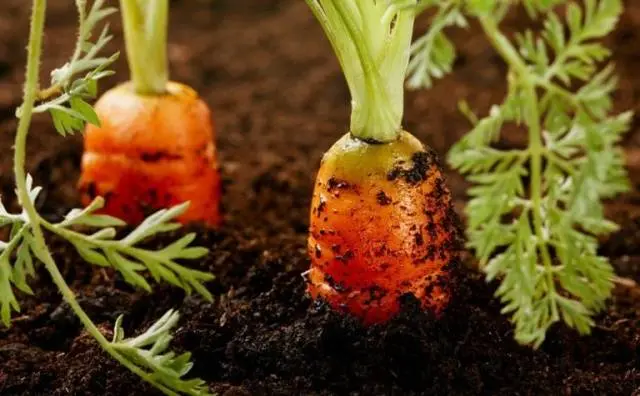Carrots grow in every garden. At least a tiny bed, but there is! Because it’s very good to go out to your garden in the summer and pick fresh carrots right from the garden! Today there is a great variety of different varieties of carrots. Some varieties are suitable for early spring sowing, while others, on the contrary, are sown before winter. Someone chooses for themselves a variety with a good quality of safety, while someone prefers a high yield. But what unites all gardeners in their desire to plant carrots every year is the sugar and carotene contained in this wonderful vegetable.
Growing carrots is generally easy. But in order to get healthy, large, juicy and sweet fruits, you need to make an effort, not to mention that, first of all, you should choose the right variety.

Each grower has his own, proven over the years, varieties of carrots. But every year, breeders bred more and more new varieties. And now it’s time to introduce a completely new variety of carrots – carrots “Emperor”.
Description
This new promising variety of carrots has very beautiful, even fruits of bright orange with a reddish tint. The shape is cylindrical, the tip is blunt, the length of the root crop is about 25 cm. The pulp is sweet and juicy, a small core, the content of carotene is increased. Ripens approximately 100 days after germination. It is perfectly stored until the next harvest, and during storage its taste only improves. It tolerates transportation well, therefore it is of commercial interest. Light loamy and sandy soils are well suited for cultivation.

For growing carrots of the “Emperor” variety, a bed is suitable, the width of which is about 1 meter. Carrots grow best in place of potatoes, onions, tomatoes, cucumbers and legumes. After harvesting these vegetables, you can immediately form carrot beds, even in the fall.
This makes it possible not to dig the beds in the spring, but simply to loosen them with a chopper. If the soil is not loose enough, it should be dug up again and all the roots should be selected. The soil in the garden should be loose no less than 25 cm deep, since the carrots are located vertically in the ground.
This is because it is very difficult for the main root to squeeze through the press of an earthen clod, so lateral roots appear. Over time, they become voluminous and here you are, the “horns” of the carrot.

To “fluff up” the soil, you should add to 1 sq.m:
- well-rotted humus or compost – 2 buckets;
- peat and sand – 1 bucket each;
- complex mineral fertilizer or nitrophoska – 50 grams.
It is necessary to mix fertilizers well with the soil and leave to settle for 3-4 days. But it is better, if possible, to do these procedures in advance, two weeks in advance, for easy compaction of the soil. If this is not possible, you can simply knock on the bed with a shovel.
You can sow in the twentieth of April, after the snow melts, making grooves about 3 cm deep on the bed, the distance between them should not be less than 15 cm. Mulch with peat and water well.
When the radish rises (and this will happen much earlier than the carrot), it will serve as a kind of beacon, marking rows with carrot seeds, thereby greatly facilitating weeding the beds. Ripe radishes are easy to remove without interfering with the growth of carrots. And carrots are good, and fresh radishes are on the table!
Rules for the care of carrots “Emperor”
- When the carrots reach about 3 cm in height, they should be thinned out to a distance between sprouts of about 2 cm.
- After the diameter of the fruit becomes 1 cm, one more thinning is needed, but the distance between plants should be left 5-6 cm.
- Time should be given to weeding, as now the carrots are beginning to gain strength and nothing should prevent them from being fed from the soil. To do this, you need to remove all the weeds, then loosen the soil in the aisle, this will increase the flow of oxygen to the roots of the carrot.
- Watering during this period is necessary, however, not very often and not very plentifully.

During the summer (in June and July), you can still feed the Emperor carrots. Which of the gardeners keeps chickens, makes top dressing based on chicken manure. Also, do not forget about loosening the soil. After the second thinning, there is already an opportunity to try a young carrot.
How and when to harvest
Harvesting takes place in mid or late September.
After the crop is dug up, it is necessary to dry it in the air for at least a few hours, then cut off the tops and send it for storage or processing.
Carrot “Emperor” according to its characteristics is a fruitful variety. And these are not simple words: from one square meter you can collect up to 8 kg of exceptional root crops. Carrots of the “Imperator” variety are stored in a cool place for up to nine months, while losses are always minimal. The root crop remains beautiful throughout the entire shelf life. Hence the conclusion: it is suitable for sale, since carrots with such external characteristics will always attract the increased attention of buyers.










